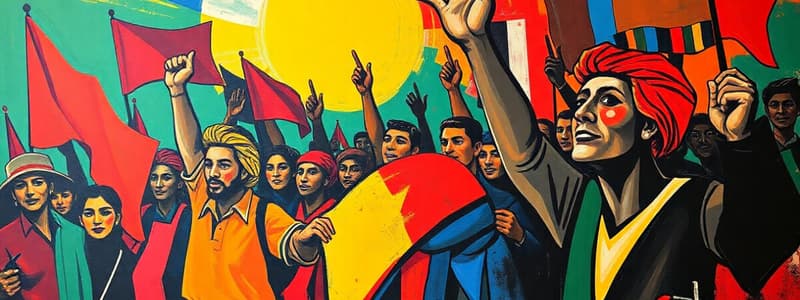Podcast
Questions and Answers
Leader of Indonesia's independence movement against Dutch colonial rule was ______.
Leader of Indonesia's independence movement against Dutch colonial rule was ______.
Sukarno
The period leading up to the Bandung Conference in 1955 is part of Phase 1 of decolonization that focused on ______.
The period leading up to the Bandung Conference in 1955 is part of Phase 1 of decolonization that focused on ______.
Asia
Ho Chi Minh was a leader of the Vietnamese independence movement against ______ colonial rule.
Ho Chi Minh was a leader of the Vietnamese independence movement against ______ colonial rule.
French
Phase 2 of decolonization affected nations in ______ and North Africa from 1956 to 1975.
Phase 2 of decolonization affected nations in ______ and North Africa from 1956 to 1975.
Nationalist movements and international support were key factors driving ______.
Nationalist movements and international support were key factors driving ______.
Flashcards
Sukarno
Sukarno
Leader of Indonesia's independence movement against Dutch rule.
Ho Chi Minh
Ho Chi Minh
Leader of the Vietnamese independence movement against French colonialism.
Phases of Decolonization
Phases of Decolonization
Three distinct stages in the process of ending colonial rule.
Nationalist Movements
Nationalist Movements
Signup and view all the flashcards
Post-WWII Context
Post-WWII Context
Signup and view all the flashcards
Study Notes
Decolonization Process
- Decolonization was a multi-stage process
- Nationalistic movements were fuelled by liberalism and Marxism
- Charismatic leaders emerged, like Mahatma Gandhi and the Indian National Congress
- International support was gained from religious groups, humanitarian movements, and the UN
- Initial stages (Asia, 1945-1955/6) primarily affected British, Dutch, and French colonies in Asia and the Middle East. Key events included the independence of India from British rule in 1947 and the Bandung Conference in 1955
- This involved the independence of countries in North Africa, mainly starting from 1956-1975.
- The later stages involved the decolonization of African colonies. This started later, around 1975
- Many colonies gained independence through peaceful means or agreements
- Some conflicts arose, leading to colonial wars, like in Algeria, Angola, or Mozambique; others had a mixed approach (diplomacy and armed conflict)
- Britain had a post-colonial relationship with many former colonies through the Commonwealth
- Some countries had internal conflicts post-independence, such as the Rhodesian Bush War or the Congo Crisis, from the 1960s. Colonial rule still had impact on newly independent nations.
- Some colonies lasted until the 1970s.
Studying That Suits You
Use AI to generate personalized quizzes and flashcards to suit your learning preferences.





